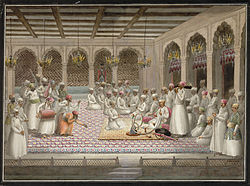Nawab
Nawab (Arabic: نواب; Bengali: নবাব/নওয়াব; Hindi: नवाब; Punjabi (Gurmukhi): ਨਵਾਬ; Persian, Punjabi (Shahmukhi), Sindhi, Urdu: نواب), also spelt Nawaab, Navaab, Navab, Nowab, Nabob, Nawaabshah, Nawabshah or Nobab, is a royal title. It was used by sovereign ruler, often of a South Asian state. It is similar to the western titles of King in many ways. The relationship of a Nawab to the Emperor of India has been compared to that of the Kings of Saxony to the German Emperor.[1] In earlier times, the title was given by the Mughal emperor to Muslim rulers of subdivisions or princely states in the Indian subcontinent who were loyal to the Mughal Empire. The title is an equivalent to the title Maharaja.
"Nawab" usually refers to males. It means Viceroy. The female equivalent is "Begum" or "Nawab Begum". The primary duty of a Nawab was the administration of a certain province.
Similar to a British peerage, The title of "nawabi" was also given to persons and families who ruled a princely state of British India. In some cases, the titles were also given with jagir grants. These were either cash or land-holdings.
Nawab Media
Robert Clive, meeting with Mir Jafar after the Battle of Plassey, by Francis Hayman
General Nawab Sir Sadeq Mohammad Khan V, the last ruling Nawab of Bahawalpur
The Procession of Yusef Ali Khan, a painting depicting Yusef Khan on his way to an encampment for the durbar held at Fatehgarh in 1859
A picture of whom is believed to be the first ever "Nawab" of Mughal Empire, "Saadat Ali Khan I" of Awadh.
The Nawab of Bengal, Mir Qasim 1757
Hyder Beg Khan of Awadh
References
- ↑ Sir Robert, Lethbridge (1893). The Golden Handbook of India. p. x.






